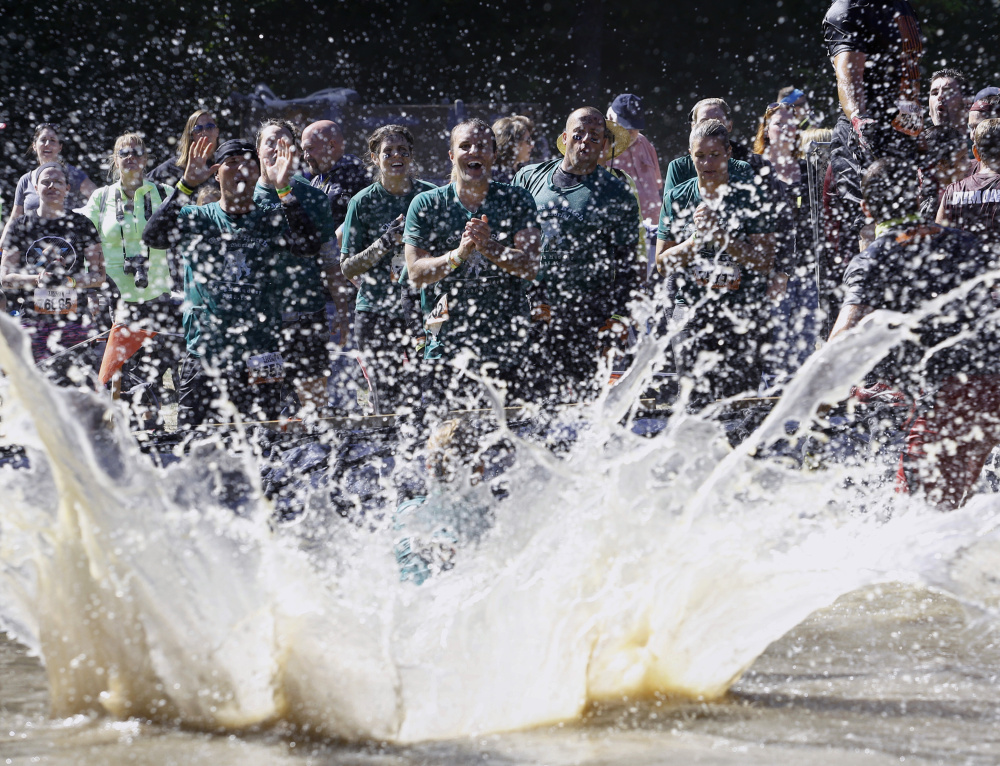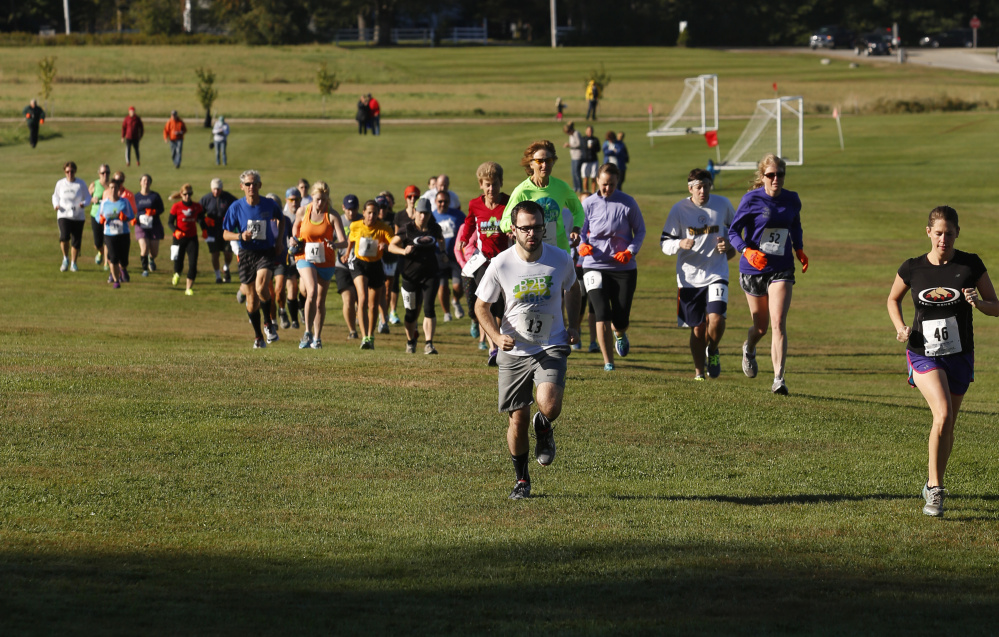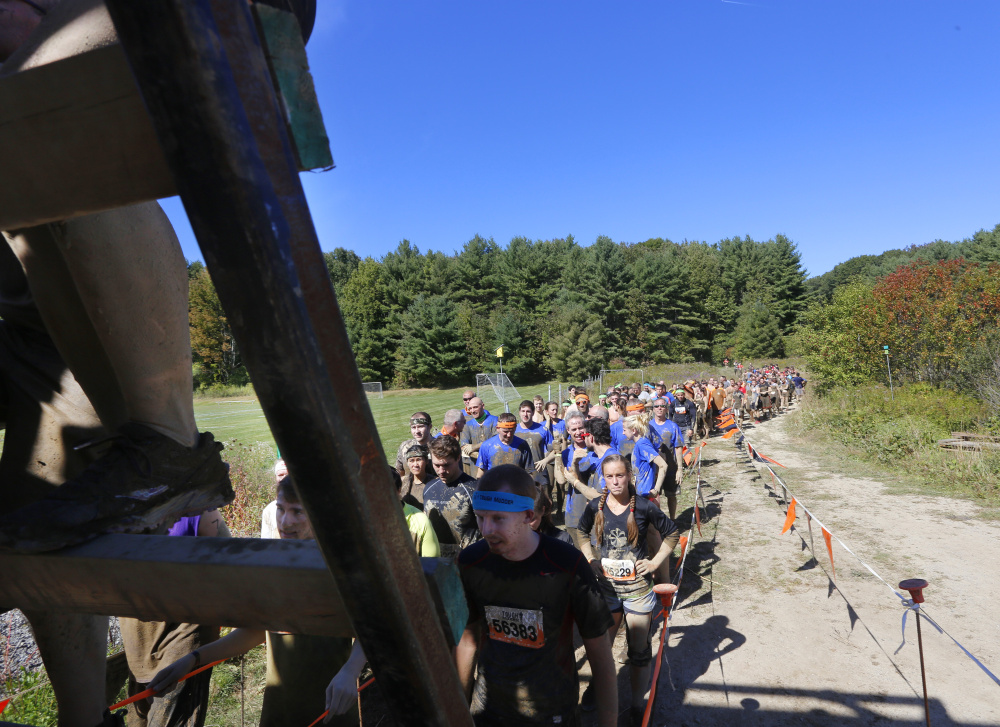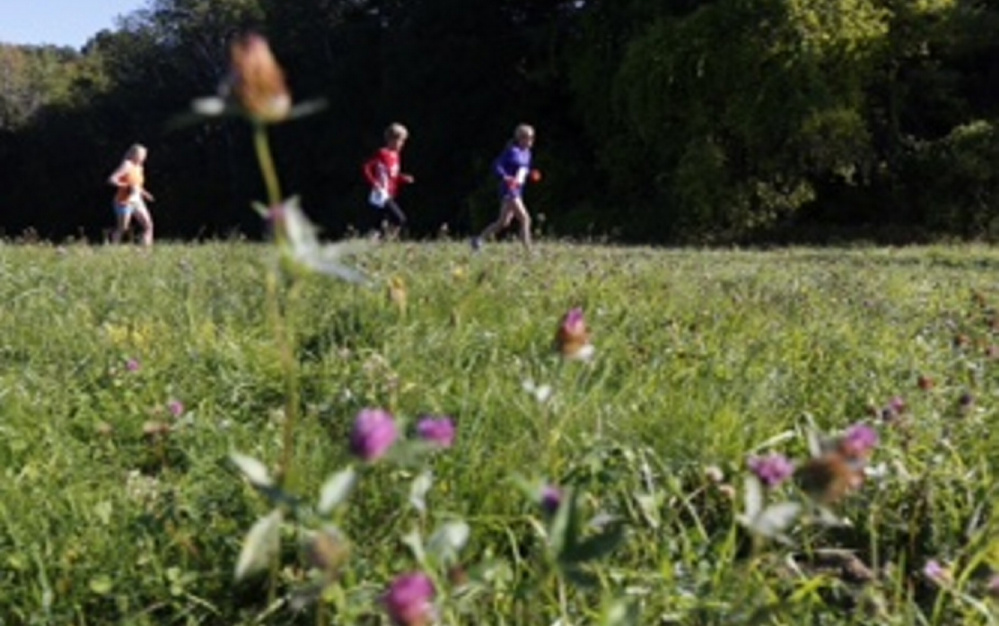Jim Davis of Falmouth was a competitive distance runner in high school and college but, like a lot of other people, grew bored with the sport.
He still runs the occasional road race, but sought something more adventurous than the Craig Cup Run for Life, a 5-kilometer trail race held Saturday in Cumberland. Instead, Davis spent the morning crawling through mud, climbing ropes, scaling walls and jumping into a dumpster filled with icy slush in the Great Northeast Tough Mudder.
“These are physical and mental challenges that test you in a lot of ways,” said Davis, a 40-year-old financial adviser who, for the second year in a row, tackled Tough Mudder with the help of three buddies. “It’s fun doing it as a team. It takes about three hours, and there’s a lot of camaraderie and sense of accomplishment when you get through it.”
The extreme obstacle-course event, which debuted in Maine last year, was expected to draw 7,500 participants this weekend in Westbrook. Tough Mudder is run by a for-profit corporation headquartered in Brooklyn, New York, that puts on more than 50 events each year on three continents.
The 5K race in Cumberland? It attracted 54 runners Saturday, down from its peak of 180 seven years ago. It is organized by the not-for-profit Maine Track Club, and raises money for the nonprofit Opportunity Alliance, whose mission includes crisis intervention and suicide prevention.
Held less than 15 miles apart, the two events juxtaposed the surge in popularity of nontraditional, themed running events and waning interest in traditional here-to-there road races lacking obstacles, costumes or the lure of free beer.
Nationally, participation in nontraditional events such as the 10.1-mile Tough Mudder approached 5 million last year after doubling in each of the previous three, according to an annual report by the nonprofit Running USA. Meanwhile, there was a 1 percent decline in finishers of traditional U.S. running events in 2014, after 300 percent growth from 1990 to 2013.
In Maine, these splashy events have had an impact on more traditional races on the local running calendar, a trend that local race directors say hurts participation and costs local charities. It’s creating a rift between local nonprofit races and out-of-state for-profits, and has led longtime race directors in the state to consider new approaches to promote their events.
“Last year it really took off,” said Howard Spear, director of nonprofit races such as the Maine Marathon and the Sea Dogs Mother’s and Father’s Day 5Ks. “Everywhere you turned around, someone wanted to start up a race. More and more of these companies are looking to come in here and set up because there’s money to be made.”
A WINDFALL FOR LOCAL ECONOMY
Not all themed events are as grueling as Tough Mudder. The Chicago-based Santa Hustle, held for the first time in Maine last November, gave runners a Santa hat, fake beard and red-hooded sweatshirt. They ran a course that included aid stations with cookies and candy. Like Tough Mudder, the event brims with photo opportunities to post on social media.
But for weekend warriors, the allure of larger-than-life obstacle courses is undeniable. The course in Westbrook, laid out at Sunset Ridge Golf Links, features 21 diabolical obstacles with names such as Beached Whale, Arctic Enema, Funky Monkey, Birth Canal and Electroshock Therapy, many of them designed to require teamwork for successful passage.
“You have to sign a pretty scary waiver to run the course,” Davis said, “because there is a propensity for people to get injured or hurt with some of the challenges.”
In addition to charging up to $220 for participation (if you waited until this weekend to register), Tough Mudder charges spectators $20 each (double that if they wait to pay on race day) and another $10 for off-site parking and a shuttle simply to watch the madness.
Tough Mudder has estimated annual revenues of more than $100 million. Its website promotes a partnership with the Wounded Warrior Project to assist injured veterans, and says participants have raised more than $8.5 million for that cause in the five years of Tough Mudder events.
“I’m pretty certain that a portion of our fees go to Wounded Warrior,” Davis said. “I like that aspect of it.”
Actually, no portion of the hefty entry fee goes to charity. Participants can raise money for their own favorite charity, and Tough Mudder provides a platform for doing so and incentives (a $25 rebate on registration, a pair of logo socks) for reaching certain tiers of Wounded Warrior Project donations.
“So much of what Tough Mudder is about is the community it creates,” said Hilary May, the Great Northeast event director. “It’s not really an individualistic achievement like a road race would be. The people out on the course really create a community. It’s a very different experience.”
May declined to share revenue figures but said, “Yeah, we’re doing well. More importantly, we have this fortunate opportunity to create these life-changing opportunities for people.”
Large-scale events like Tough Mudder are a coup to local businesses and pump millions into the Maine economy. Three out of four participants in last year’s event in Westbrook came from out of state.
“We estimated, based on how many were staying overnight and all the services they paid for, that the economic impact was more than $3 million,” said William Baker, Westbrook’s assistant city administrator and director of business and community relations.
Chandra Leister is the race director of the Craig Cup Run for Life and president of the all-volunteer Maine Track Club. She also serves as director of programming and marketing at the Portland Regional Chamber of Commerce, so she knows how excited Westbrook officials (and recruiters from the Maine Sports Commission and the Greater Portland Convention and Visitors Bureau) are about Tough Mudder’s return this year.
“I will say that the Tough Mudder comes in and does great things for the city of Westbrook in terms of visitors, hotel nights and things like that,” she said. “I’m not so sure about the charities. I’ve only heard the commerce side of it.”
NONPROFIT RACES RUNNING BEHIND
In January and again in April, a group of Maine race directors met to discuss the possibility of a “run local” movement similar to campaigns that encourage people to shop and eat locally, but consensus between nonprofit and local for-profit directors – whose races also have charitable components – was difficult to achieve.
But their fears about declining participation seem warranted.
This spring, both the Mother’s Day and Father’s Day 5K races in Portland saw a second straight year of fewer registrations, down 11 percent and 26 percent, respectively, from 2013.
The Maine Marathon and Half Marathon, which last year closed registration in late August after reaching its cap of 3,500 runners, are still accepting entries through the end of this week for races scheduled for next Sunday morning. Spear said that on Aug. 25, the date he capped out in 2014, registrations were 1,000 behind last year’s pace.
After taking care of 2014 expenses, the Maine Marathon doled out $107,480 to a variety of not-for-profit organizations, including a $50,000 contribution to its designated charity, The Robbie Foundation, which assists children with developmental disabilities. Runners donated another $4,355 to the foundation, which ends its two-year cycle as beneficiary next month.
What rankles race officials like Leister is an event such as the Santa Hustle – also recruited by the Maine Sports Commission – plopping down at the Maine Mall on the Sunday before Thanksgiving. That’s the same date as the 47-year-old Turkey Trot, a not-for-profit 5K race in Cape Elizabeth that donates money and canned goods to help Wayside Food Programs combat hunger.
In 2013, after three years of continued growth, the Turkey Trot attracted 684 runners who donated 2,646 pounds of nonperishable food, and organizers presented Wayside with the event’s net proceeds of $3,250. A year later, with the Santa Hustle 5K and Half Marathon in neighboring South Portland, donations from 570 runners resulted in 1,804 pounds of food and a check for $2,500.
That’s a 32 percent drop in food donated and a 23 percent drop in money.
“If we had that kind of turnaround in a corporation,” said Bob Ayotte, the Turkey Trot race director, “we would use the word devastation.”
Erik Boucher, a for-profit race director who lives in South Portland, was hired to work last year’s Santa Hustle. He said he recognized a few local runners, but most of the field of 2,078 didn’t fit a running stereotype.
“I saw a lot of people I never see at races,” he said. “They were in it just because of the excitement around a Santa-themed race.”
The Santa Hustle took in more than $100,000 in entry fees. There was a charitable component, however. Easter Seals Maine provided 200 volunteers (dressed in elf suits) and received $5,000 in return.
That’s a significant donation, said Kelly Couture, the Easter Seals development manager, and didn’t require a lot of heavy lifting.
“They bring everything in, from the giant parade-like balloons to all of the flags and stations and tables and pop-up tents,” she said. “It’s actually why a charity like ourselves prefers to partner with an event like that. Because to pull that off ourselves would be really difficult.”
What’s more, the leftover food not eaten by runners went to Wayside Food Programs, whose head of operations received a call from Boucher while en route to a warehouse with the Turkey Trot donations.
“This is where it’s hard to dislike what they’re doing,” said Ayotte, the Turkey Trot race director. “Frankly, if the Santa Hustle was the weekend after my race, we’d be having an entirely different conversation.”
MORE RACES, MORE DONATIONS
Boucher also directs the Old Port Half Marathon and 5K races, whose fields have grown in each of the past four years to become second in the state behind the internationally known Beach to Beacon 10K Road Race. Old Port amenities include a beer garden, lobster bake and free race photos. Race beneficiaries – Cancer Community Center, Habitat for Humanity of Greater Portland and Portland Trails – shared a total of $25,000 in proceeds.
Boucher said he could not operate without social media and its networking power.
“My personal philosophy is that I have to constantly innovate and be on top of things,” he said. “It’s a hard pill to swallow, but I think part of the reason we see some races shrinking or contracting is that they haven’t changed in 30 years.”
That thinking led Boucher to attempt his own nontraditional event, a 200-mile relay from Bar Harbor to Portland with 36 legs requiring multirunner teams. The Rock Lobster Relay is scheduled for June 24-25, 2016.
Another local for-profit race director, Julie Marchese of Cumberland, operates the Dynamic Dirt Challenge, an obstacle event on a smaller scale than Tough Mudder, at Pineland Farms in New Gloucester in May. Marchese said the DDC drew a field of 900 over two days in May and resulted in a $10,000 donation to Easter Seals.
“All that money comes from us, the race organizers,” she said, noting that the Santa Hustle field was more than twice as large but donated half as much to Easter Seals. “We’re really doing it to benefit our communities, because we live and work here.”
Among her other events are the Tri-for-a-Cure triathlon and next month’s inaugural Power of She 10K, both for women only. The Maine Cancer Foundation owns the triathlon, which raised $1.5 million this year. The Power of She benefits the Maine Women’s Fund through both a donation from race organizers and individual runner fundraising, which is encouraged but not required.
Marchese said she hoped for a field of 1,000 women for the state’s first all-female 10K. Instead, registration is running far short of that goal.
“We’ll be over 200,” she said, “but that has taken a lot of work. I think there’s just too much stuff going on now.”
HOPING DROP-OFF WAS A FLUKE
Marchese compared the proliferation of outdoor running-based events like Tough Mudder and the Color Run to the time when suburban malls sprouted up and siphoned off customers from downtowns, which in Portland’s case led to the closing of local icons such as Benoit’s clothiers and the Porteous department store.
“Tough Mudder is a great thing,” she said. “Everybody wants to try it at least once. But it’s not local. They’re here for 48 hours and then they’re gone, and most of the money goes with them.”
To Boucher, the surge in popularity of events that emphasize fun – whether it involves mud, foam, obstacles, zombies, costumes and/or beer – simply grows the pool of active people.
“Everyone goes through an evolution of fitness,” he said. “Maybe they start off with a 5K, get excited about it and challenge themselves with a half or a full marathon. The introduction of all the new events in the state is generally good for all of the events, because it’s introducing more people to the fitness community.”
Meanwhile, less than two months remain before the Turkey Trot and Santa Hustle take place on the Sunday before Thanksgiving. Ayotte, the Turkey Trot race director, knows what he’s up against. He already sent emails to recent participants emphasizing the impact of the race on the Wayside Food Programs.
“In the last three years, we’ve raised enough food and money to provide 10,000 meals to hungry people,” he said. “We’re trying to make the Turkey Trot stand out even though we don’t serve beer, we don’t have obstacles and we’re not throwing paint.”
Ayotte said he hopes last year was a fluke, a blip in a stretch of otherwise rising participation for his event.
“If there were runners I lost because of Santa Hustle,” he said, “I hope they enjoyed it and did it once and want to get back to supporting a local race with a local charity, and I will welcome them back with open arms.”
Send questions/comments to the editors.











Success. Please wait for the page to reload. If the page does not reload within 5 seconds, please refresh the page.
Enter your email and password to access comments.
Hi, to comment on stories you must . This profile is in addition to your subscription and website login.
Already have a commenting profile? .
Invalid username/password.
Please check your email to confirm and complete your registration.
Only subscribers are eligible to post comments. Please subscribe or login first for digital access. Here’s why.
Use the form below to reset your password. When you've submitted your account email, we will send an email with a reset code.